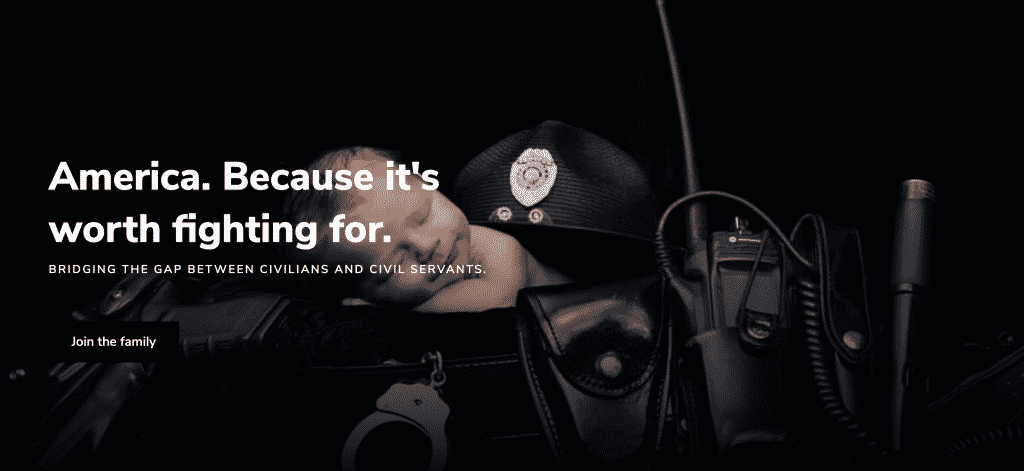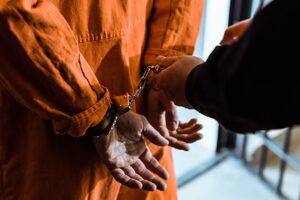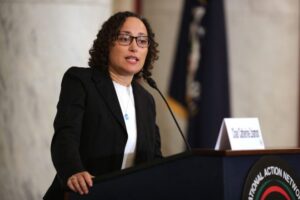The following contains editorial content which is the opinion of the author.
—
WASHINGTON, DC- Seriously? ABC News is gushing after a currently incarcerated inmate won an election as a neighborhood commissioner on the southeast side of Washington, D.C.
The election of a criminal in DC shouldn’t come as a surprise, since former mayor Marion Barry was reelected after having served a six-month prison term for smoking crack in a downtown DC hotel room, which was caught on tape.
Last week just prior to the conclusion of ABC’s This Week, the fill-in host, Jonathan Karl had a virtual thrill running down his leg when introducing a report about a “historic election” that occurred in the nation’s capital, the Media Research Center reported on their Newsbusters page.
Karl, beside himself with joy, touted the election of inmate Joel Caston as “charting a new course for voting rights and racial justice,” then going on to make the completely radical suggestion that convicted felons still incarcerated should be allowed to vote.
Interestingly, as reported by NBC News, all five of the candidates for the advisory commission were currently incarcerated inmates.
“After 27 years behind bars, Joel Caston is seeking redemption through politics,” senior ABC Washington correspondent Devin Dwyer beamed.
The headline on the screen read, “Incarcerated Felon Wins Groundbreaking Election,” as Dwyer gushed:
“The 44-year-old felon convicted for murder as a teenager became D.C.’s newest elected public servant this summer, winning a groundbreaking campaign for neighborhood commissioner on the city’s southeast side.”
Dwyer said that Caston’s “constituents are fellow inmates in a D.C. jail,’ then explained:
“All casting ballots in a local election that’s pushing the boundaries of voting rights and racial justice. D.C. last year joined just Maine and Vermont as the only places in America that prisoners can vote.”
Ah, but Dwyer’s joy turned to sadness as he complained about those criminals who are not allowed to vote:
“Less than one percent of the nation’s estimated 1.8 million incarcerated residents has the right to cast a ballot from behind bars, setting the U.S. apart from many other democracies.”
ABC then played a soundbite from a left-wing Georgetown University professor (seriously, are there any other kind?) in which Professor Marc Howard said:
“In other words, in most places you don’t lose your humanity, you don’t lose your civil rights, social rights, political rights when you’re incarcerated.”
As MRC notes, “the liberal academic doesn’t understand that the very act of being in prison causes criminals to lose many of their ‘civil rights’ as punishment.”
Dwyer then went on to push Howard’s advocacy for felon voting rights, referring to him as “a leading advocate for felon voting rights, [he] says it’s also an issue of racial justice.”
“One in 16 black American adults is disenfranchised because of a conviction, a rate 3.7 times higher than among non-blacks,” Howard said.
“Ultimately this is about human beings with the right to express themselves. And I think that voting is a really fundamental right that they should have.”
Howard did not explain or address the fact that blacks offend at a rate much higher than whites or other races, which certainly contributes to that number.
Dwyer continued his cheerleading, noting, “Caston is now the first incarcerated American elected to office with votes from incarcerated peers!”
Dwyer then asked Caston, “You oversee everything from liquor license approvals to sidewalk repair to public safety. Can you credibly advocate for public safety from in here?”
“I can,” Caston said. “I believe that my story, my campaign is giving a lens to individuals who may not have considered this as being a viable option to obtain public safety.”
Dwyer then gave his biased, personal political opinion about Republicans and the radical Democrat election-stealing proposal, HR-1.
“Enfranchisement of felons remains highly controversial,” Dwyer said. “Many Republicans opposed House Democrats’ sweeping election reform bill, HR-1, this spring in part because it would have restored the vote to millions of ex-felons.”
In fact, Republicans oppose HR-1 because it would guarantee Democrats control the White House and Congress in perpetuity. It’s not as much a “election reform” bill as it is a “codify cheating for Democrats” bill.
In wrapping up his story, Dwyer said the family of Caston’s victim “has given its full endorsement” of his election
“The family of the victim in Caston’s case has given its full endorsement, in a statement to ABC News saying, ‘We believe in forgiveness! And hope Joel will do good work in the community.’ His constituents told us Commissioner Caston, who expects to be paroled by the end of the year, is already inspiring them to be better citizens.”
Karl, clearly moved by the felon’s story of “redemption” added on at the conclusion of the piece:
“Thank you to Devin Dwyer for that amazing story of redemption.”
Giving current inmates the right to vote and especially to run for office is certainly not something that complies with the thoughts of mainstream Americans and is clearly only a priority of the radical left.
Apparently, ABC News is down with that portion of the revolution, trying to put “lipstick on a pig” so to speak and spinning this as some kind of feel-good story.
We would expect nothing less from the lamestream media.
Following is a report we filed last year about California’s attempts to allow convicted felons still on parole the right to vote. For more on that, we invite you to:
DIG DEEPER
SACRAMENTO, CA- On Tuesday, November 3rd, Californians decisively passed a ballot measure that will let convicted felons who are still on parole the ability to vote in their state.
A huge WIN in California for voting rights. Parolees will have their right to vote restored. https://t.co/IsRUtTKry9
— Gavin Newsom (@GavinNewsom) November 4, 2020
According to reports, California’s Proposition 17 changed the state constitution that had disqualified felons from voting until their incarceration and/or parole and been completed. Unofficial tallies on the morning of November 4th, showed that roughly 59 percent of California voters chose to restore the parolees voting rights.
Supporters of the proposition said that those on parole have paid their debt to society and should be able to shape the policies that impact their lives. Opponents of the proposition said that restoring voting rights early to felons is a slap in the face to their victims.
However, there was no large organized opposition movement fighting the constitutional change either.
Prop 17 in California passed. The right to vote has been restored for tens of thousands of people. All formerly incarcerated people in California can now vote. Felony disenfranchisement is done.
— Matt Haney (@MattHaneySF) November 4, 2020
Democratic State Assemblyman Kevin McCarty, with the support of the California Democratic Party and U.S. Senator Kamala Harris (D-CA), authored the ballot measure. McCarty said in a statement:
“Prop. 17 gives Californians the chance to right a wrong and restore voting rights for a marginalized community and people of color. This is good for democracy and good for public safety.”
The ballot measure is seen as a piece of criminal justice reform as McCarty proposed the measure when the Black Lives Matter protests across the country were sparking conversations about reform. Reports from California Department of Corrections and Rehabilitation show that three out of four men leaving California prisons were black, latino, or asian.
Prop. 17, a ballot measure allowing 50,000 former prisoners in California to vote while on parole, won Tuesday. https://t.co/4gnfq16Ewh pic.twitter.com/0by7RXstcE
— San Francisco Chronicle (@sfchronicle) November 4, 2020
Part of Prop. 17 campaign materials said that the high number of minority convicted felons is a direct result of “persistent and systematic racial inequalities in the criminal justice system.” Taina Vargas-Edmond, executive chair of the Yes On Prop. 17 campaign and co-founder and executive director of Initiate Justice said:
“For far too long, black and brown Californians have been excluded from our democracy. Today, California voters definitively righted a historic wrong.”
Vargas-Edmond went on to call the passing of Prop.17 a “victory for democracy and justice.” Prior to the passing of this ballot measure, California was only one of three states that required those convicted of felonies to complete their parole sentences before restoring their right to vote.
Prop 17 passes, restoring felony parolees’ right to vote in California https://t.co/8snnagux2p
— ABC7 News (@abc7newsbayarea) November 4, 2020
California Secretary of State Alex Padilla helped raise more than $1.3 million for the Prop. 17 campaign. Padilla said in a statement:
“Today, in California there are 50,000 women and men who have completed their state prison sentence, are reintegrating back into society, working jobs and paying taxes, but are denied the right to vote.”
He added:
“Yet, research shows that in jurisdictions where voting rights are more easily restored, formerly incarcerated individuals re-offend at lower rates.”
CA ELECTION RESULT: A ballot measure restoring the right to vote for felons on parole was decisively passed by California voters on Tuesday. https://t.co/0qde2SRoSv
— KSBW Action News 8 (@ksbw) November 4, 2020
A study from 2004 that was conducted by sociology professors at the University of Minnesota and New York University determined that among people who had been previously arrested, only 12 percent of voters were re-arrested compared to 27 percent of non-voters who were re-arrested.
19 states currently allow convicted felons on parole to vote. In Main, Vermont and D.C., convicted felons can actually vote while they’re still incarcerated. Under current law in California, convicted felons who are still incarcerated cannot vote, however, convicted felons on probation can.
The Associated Press estimated that the passage of Prop. 17 restored voting rights to about 50,000 convicted felons. Vargas-Edmond said:
“50,000 Californians now have their rightful say in their democracy, but this is only the first step. Moving forward, we must work to ensure that voting rights are restored to people currently incarcerated in state and federal prisons as well.”
Do you want to join our private family of first responders and supporters? Get unprecedented access to some of the most powerful stories that the media refuses to show you. Proceeds get reinvested into having active, retired and wounded officers, their families and supporters tell more of these stories. Click to check it out.

CHICAGO, IL – Chicago is allowing inmates to vote while incarcerated, making this the first in-person jail voting operation.
Volunteers arrived at Cook County Jail on Saturday (Mar. 10) to ensure detainees had a chance to vote in person. Organizers with a group called Chicago Voters tell WLS-TV that 94% of the inmates are eligible to vote and reinforced the city’s early voting lobby.
Each division of the jail was equipped with a private voting booth, an attorney, and staff from the Chicago and Cook County Board of Elections.
This move is leaving some wondering if it is simply the right thing to do, or if there is a political agenda behind it all.
Gianno Caldwell, a DC area Republican strategist originally from Chicago, told Fox and Friends:
“An interesting fact, and what you don’t really see is that a number of elected officials run these particular jails. Look at Cook County as an example. It is the largest prison system in Illinois. It is run by a man by the name of Sheriff Dart. This is an elected official.
No one has thought about, apparently, where this is an area where they can manipulate inmates to make a certain decision in favor of a candidate that either Sheriff Dart supports or himself.”
Caldwell continued:
There are approximately 7,000 inmates at any given time in the Cook County jail. This should be a serious consideration given that so much corruption takes place in Illinois, specifically in Cook County.”
Michael Starr Hopkins, an attorney, argued those points.
He said that this is not about manipulation:
“I think this is about making sure that everyone can vote. This shows why we need the Voting Rights Acts needs to be restored.
These are people that are in jail, not in prison, so they still have the presumption of innocence and are afforded their right to vote. Just because they are incarcerated doesn’t mean they shouldn’t be allowed to perform their right to vote. I think this is a basic American tenant.”
So, they want to let inmates out of jails because of the dreaded virus and they’re so scared that offenders will contract it inside the facilities, yet they bring an unknown number of volunteers into those same facilities to assure they get to vote, in person. Got it.
At Law Enforcement Today, we firmly believe that our constitutional rights must be upheld and enforced. But do we not forfeit certain rights when incarcerated?
For example, even in pre-trial confinement, an inmate has no reasonable expectation of privacy. Fourth Amendment protection is incompatible with the concept of incarceration, and the needs and objectives of penal institutions.
Prison employees can go through an inmates mail, incoming or outgoing. They are able to search cell areas, bunks and the inmates themselves without reasonable suspicion or probable cause to look for contraband like drugs, weapons and cellphones.
Even with that being the case, the states of Vermont and Maine allow inmates serving time for felony charges to vote while incarcerated. Fourteen other states restore voting rights once a convict has served their time and is released back into society.
A politician in New Jersey went so far as to say that voting keeps people out of prison. Law Enforcement Today shared that story with you in November of last year.
In what has become a commonplace concept, a bill before New Jersey lawmakers could restore voting rights to tens of thousands of people in the state.
The proposal (A5823) allows for residents on probation or parole to cast ballots. It will be on the floor of the state Assembly Appropriations Committee.
Assemblyman Jamel Holley, a Democrat, and one of the bill’s sponsors, said people who had served their time behind bars deserved a say in the political process.
According to New Jersey’s Administrative Office of the Courts, there were more than 56,000 people on probation last year, with an additional 15,500 on parole.
Advocates argue that extending voting rights is an extension of the civil rights movement, because of the criminal justice system’s disproportionate impact on African Americans. They also claim that voting reduces recidivism, and helps people reintegrate into society.
Opponents have argued that losing the right to vote is a just punishment, and that criminals should be kept from influencing public policy.
According to the Huffington Post (of all media companies), there is no magic pill or program that will end recidivism. The most effective programs have been found to reduce recidivism by about 10 to 15 percent; on rare occasion, up to 20 percent. Treatment programs work, but this doesn’t mean that everyone who participates in a program will be crime free upon release.
All the studies on recidivism theorize that full re-enfranchisement, which includes voting rights, reduces the rate by 20%. But again, that is theory. There are no actual numbers to support that.
In fact, one side of the argument is that in the sample group they used to arrive at those numbers, the percentages would have been the same without restoring voting rights.
Taking this one step further, some argue that the removal of voting rights of convicts is purely political. It is simply a move to suppress the vote of blacks, who make up the large portion of the criminal population.
But it can also be argued that those who want to restore these rights are doing so for political gain as well. As African Americans in the U.S. tend to vote for more progressive and left-leaning policies.
Although the bill would still bar people in prison from voting, Holley said he hopes to change that next, and wants to work with the state Department of Corrections and other agencies to discuss inmates voting.
Other states have also changed how they treat people convicted of crimes. Maine and Vermont allow people in prison to vote. Florida recently restored voting rights to felons, but that change is currently before the state’s supreme court.
“They are part of our community,” Holley said.
Where have we heard that before? How about New Jersey’s next-door neighbor?
Feeling that they are being outrun by California in the race to jump off a cliff of to flee logic and common sense, a New York state lawmaker is proposing legislation to make prison inmates eligible to vote in elections, while still incarcerated.
State Sen. Kevin Parker (D-Brooklyn) introduced a bill before Election Day on Tuesday, November 5, that would allow prisoners to register and vote while incarcerated.
The state and county boards of elections would keep tabs on the program and convicted felons would also be allowed to take part.
“If an incarcerated individual can be counted as a whole person in the census, then why can’t their vote be counted in an election?” explained Parker in the bill memo, arguing current laws are unfairly slanted against incarcerated minorities.
Parker’s proposal is even receiving kickback from fellow Democrats, who argue that voting is a right that should be taken away if incarcerated.
“If an individual has committed a crime and is incarcerated, they have lost the right to vote. They should serve their sentence and not be allowed to exercise a right they once held,” State Sen. Monica Martinez (D-Suffolk) told the Post.
Democrats also pointed out logistical problems with the legislation, such as a provision that would count the inmate’s vote in the district where he or she lived before incarceration.
“This will conflict with the census count, which is the way we determine legislative districts,” said State Sen. Diane Savino (D-Staten Island).
That’s because legislative districts are determined by an area’s population— which would include the inmates in areas where they once lived before they were locked up.
I guess they will have to use absentee ballots if the measure passes.
This isn’t the first time New York has jumped into the “let’s let criminals have a say in our elections” pool.
In 2018, New York Democrat Gov. Andrew Cuomo restored the voting rights of 35,000 convicted felons out on parole.
As he has clearly stated in his campaign, Senator Bernie Sanders’ wants rapists and murderers to vote. But Americans don’t agree with me.
Last week, the Vermont senator was asked to clarify during a CNN town hall if he supports voting rights for people convicted of rape or those like the Boston Marathon bomber.
He said that even “terrible people” should be given permission to vote, saying that it’s a “slippery slope” to disenfranchise any group of people.
“I think that is absolutely the direction we should go,” Sanders said. “In my state, what we do is separate. You’re paying a price, you committed a crime, you’re in jail. That’s bad,” he said. “But you’re still living in American society and you have a right to vote. I believe in that, yes, I do.”
A new INSIDER poll found that 75% of people surveyed don’t agree with Sanders that all prisoners should have voting rights.
The results found that while 35% did say current inmates should be allowed to vote, most said it should only apply to non-violent offenders.
Of those surveyed, 24% believe those convicted of violent offenses should never be allowed to vote, even after being released from prison.
Another 15% said all prisoners – regardless of their crimes – should be allowed to vote from behind bars. A total of 20% said only voters who are convicted of non-violent offenses should be allowed to vote.
What’s the law say? It’s currently decided by states whether current or former inmates are allowed to vote.
In Sanders’ state of Vermont, felons keep their voting rights regardless of whether they’re incarcerated.
There’s a lifetime voting ban on people convicted of murder or rape in Alabama, Mississippi, and Tennessee. In Kentucky and Iowa, anyone with a felony record is blocked from voting for life, unless the governor intervenes.
In the voting survey, another 30% said people currently in prison should lose their right to vote but be re-enfranchised when they’re released. Another 24% of those surveyed said those convicted of violent felonies should permanently lose voting rights.
About 10% of respondents said they “don’t know” how they feel about this issue.
According to a non-profit called The Sentencing Project, which is focused on criminal justice reform, some 6.1 million people in America have been “forbidden to vote because of felony disenfranchisement, or laws restricting voting rights for those convicted of felony-level crimes,” according to a 2016 report from the group.
“This is the last major voting bloc that is missing from our democracy,” said Marc Mauer, the executive director of the Sentencing Project.
In the survey, there was a sharp divide in views on this issue along party lines.
Nearly half of likely Democratic primary voters – a total of 47% – support enfranchising prisoners in some capacity. On the Republican side? 21%.
Sen. Lindsey Graham, Vice President Mike Pence, President Donald Trump, and even some 2020 Democrat contenders for President have attacked the idea.
“Let the Boston bomber vote — he should be voting, right?” Mr. Trump said in a speech to members of the National Rifle Association. “I don’t think so. Let terrorists that are in prison vote, I don’t think so. Can you believe it? But this is where some of these people are coming from,” said President Trump.
In an attempt at relevancy, Representative Alexandria Ocasio-Cortez, a progressive Democrat from New York, weighed in.
“Instead of asking, ‘Should the Boston Bomber have the right to vote?,’” she wrote on Twitter, “Try, ‘Should a nonviolent person stopped w/ a dime bag LOSE the right to vote?’”
That question, she wrote, applies to “WAY more people.”
Sanders says other countries do it… so America should, too.
He then doubled down on it:
“Every American citizen must be able to vote,” he tweeted. “Period.”
Sanders’ campaign manager responded to the president and vice president:
“If Trump and Pence truly believed in freedom, they would work to make it easier for people to participate in the political process, not harder.”
Currently there are 48 states that allow felons to regain their voting rights after they are released from prison, but it depends on where a person is incarcerated. For example, some states automatically restore them after release, others do so after parole or probation is completed, and others depend on the crime committed.
Florida became a hot debate state after a November measure restored voting rights to more than 1.4 million people who lost them because of their criminal records.
There are currently about 130 other felon voting rights bills working their way through 30 state legislatures, with at least four states currently considering allowing people presently incarcerated to allow to vote.
And depending on the results of November’s presidential election, we could see this type of legislation become a national agenda.
Want to make sure you never miss a story from Law Enforcement Today? With so much “stuff” happening in the world on social media, it’s easy for things to get lost.
Make sure you click “following” and then click “see first” so you don’t miss a thing! (See image below.) Thanks for being a part of the LET family!








